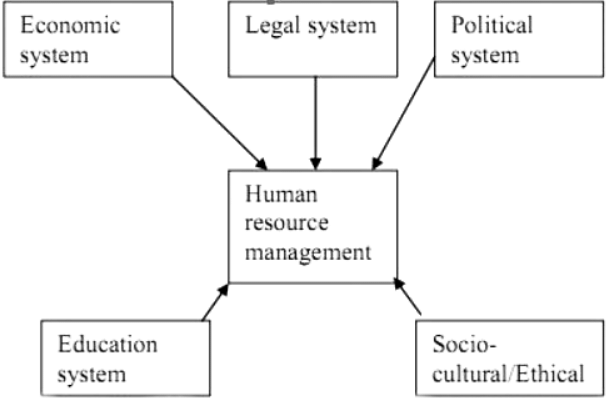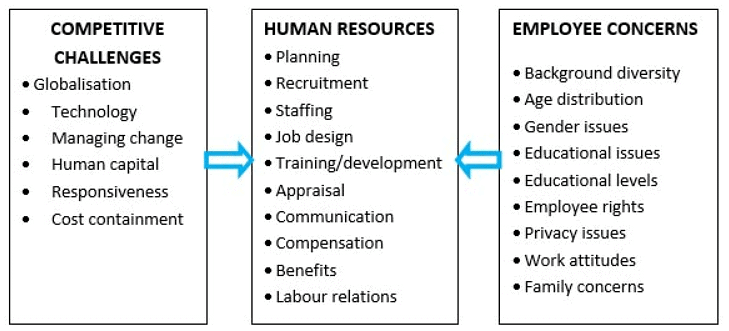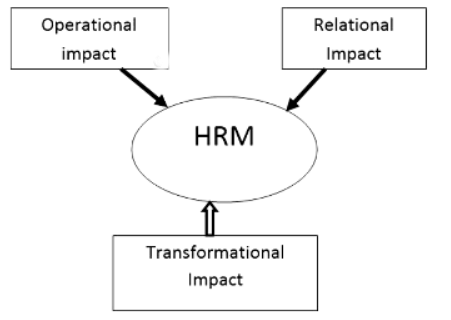HR Challenges | Management Optional Notes for UPSC PDF Download
Introduction
Human resources play a crucial role in any organization, and their effective management is essential for significant organizational success, offering a substantial return on investment for sustainable competitive advantage (Luthans and Yousef, 2004). However, in the intricate business environment, managers encounter a variety of issues arising from globalization, technological advancements, and shifts in the political and legal landscape. These factors contribute to alterations in the roles of specialized personnel. Presently, a primary challenge for Human Resource Management (HRM) is the recruitment, retention, and development of talented employees while operating on a global scale.
Factors affect human resource in global level

Human resource management encounters a multitude of challenges in the contemporary business environment, as indicated by various studies.
Challenges and framework of human resource

- The primary challenge faced by human resource management is the phenomenon of globalization. Globalization, at a political and economic level, involves the denationalization of markets, politics, and legal systems, contributing to the integration of the global economy. This denotes the expansion of business activities beyond national borders, driven by market forces that have been in operation for centuries across various levels of human financial activity. The consequence of rapid internationalization of business has impacted human resource management, presenting challenges related to unfamiliar laws, languages, practices, competitions, attitudes, management styles, and work ethics. HR managers are confronted with the task of handling more diverse functions and increased involvement in employees' personal lives.
- Another challenge faced by human resource management is workforce diversity. This involves dimensions such as age, ethnicity, ancestry, gender, physical abilities/qualities, race, sexual orientation, educational background, geographic location, income, marital status, military experience, religious beliefs, parental status, and work experience, as stated by management theorist Thomas (1992). The success of any organization relies on the managerial quality of top and middle-level teams that bring innovative ideas, perspectives, and views to their work.
- Effectively managing and valuing diversity is considered a crucial component of effective people management, leading to improved workplace productivity (Black Enterprise, 2001). Managing diversity goes beyond acknowledging differences; it entails recognizing their value, combating discrimination, and promoting inclusiveness. Managers may face challenges related to workforce losses and decreased productivity due to prejudice and discrimination, as well as complaints and legal actions against the organization (Devoe, 1999).
- However, these challenges and difficulties related to workplace diversity can be transformed into a strategic organizational asset. By leveraging the talents of individuals from diverse cultural backgrounds, genders, ages, and lifestyles, an organization can fully exploit business opportunities, especially in the global arena. Failure to handle diversity successfully in the organizational environment may lead to the loss of talented employees, benefiting competitors and resulting in low productivity and a downturn in the fiscal system.
- This is particularly relevant for multinational companies with international operations that recruit individuals from different nations, ethnicities, and cultural backgrounds. Therefore, HR managers need to be vigilant and adopt a "Think Global, Act Local" approach in various business situations. This approach involves adopting a global perspective in formulating the company's vision, long-term goals, and objectives, and devising an effective strategy to achieve them. However, adaptations are made in each market according to the culture and specifications of that specific market.
- While establishing a global vision is crucial for attaining the primary objective of profit maximization through intensive market expansion across countries and continents, the strategy adopted by multinational companies must be flexible. Challenges associated with the need for companies to adapt to local differences can be categorized into three groups: cultural misunderstanding, incompetent management, and changing needs. Cultural misunderstanding can lead to significant mistakes in doing business, especially when there is a fundamental difference in culture between the home country of the company and the culture of the host country (Grosse, 2000). Understanding and thoroughly learning the culture of an overseas market is essential for successful adaptation attempts and to avoid counterproductive outcomes.
- In India, with its large population and aspirations for a high-tech and knowledge-based economy, foreign talents are attracted to contribute their expertise in various areas. As a result, local HR managers often undergo cultural-based Human Resource Management training to enhance their abilities in leading a team of highly competent but culturally diverse experts. Additionally, HR professionals must assure local employees that these foreign talents do not pose a threat to their career advancement. The effective management of workplace diversity relies heavily on the skillful balancing act performed by HR managers.
- Another significant challenge for HR managers is technological advancement. They must navigate the rapid changes in technology that impact the nature of work and lead to obsolescence. Advanced technology has the potential to reduce job opportunities for those with minimal skills while increasing demand for technical skills. This shift, known as the transition from manual labor to knowledge-based work, necessitates companies to adapt their business operations to new technologies. While advanced technology may contribute to unemployment, it also creates a shortage of skilled manpower. Consequently, HR faces challenges in managing the workforce amid these technological transformations.
- Changes in the political and legal environment pose challenges for HR managers within organizations. Political and legal transformations signify shifts in political parties and regulatory frameworks, leading to the enactment of new laws that companies must adhere to while conducting global business. These alterations impact the legal and political landscape that governs the country's industrial relations system. Human resource and industrial relations officers bear the responsibility of thoroughly examining the implications of these changes and making necessary adjustments within the organization. Human Resource managers need to anticipate these changes and prepare the organization to confront them seamlessly without disruption to its normal operations.
- Another HR challenge in the business environment is changes in the financial landscape, involving an assessment of the impact of various factors on production. Significant factors include raw material shortages, power and electricity availability, the influence of consumerism, growing consumer awareness and demand for quality products, sustained inflationary pressures affecting the purchasing power of the currency, and escalating workforce aspirations for higher salaries and additional material benefits. In an inflationary economy, resources become limited, leading to increased costs for machinery, materials, and labor, resulting in rising capital and operating expenses.
- During the Information Technology boom, HR managers face challenges adapting to the business environment and effectively overseeing their teams. Information technology has impacted HRM primarily through human resources information systems (HRIS), streamlining data processing and making employee information more accessible to managers. This involves employing electronic computers in the managerial decision-making process and anticipates that computerized information systems will significantly influence the coordination and strategic levels of organizations in the future.
Impact of information technology on human resource

- To mitigate human resource challenges arising from globalization and technological advancements, effective organizational management is crucial.
- One approach to addressing these challenges is providing cross-cultural training for HR personnel, enabling them to understand and appreciate different cultural backgrounds. Additionally, organizations should focus on motivating professional staff to reduce frequent job changes. It is emphasized that financial incentives may not always be essential; non-financial motivators such as employee training and job satisfaction are equally important. HR departments should be adept at adapting to change rapidly, akin to the speed of the internet.
- An alternative approach to addressing human resource challenges involves adapting HR strategies in response to changes in the economy. HR strategies should exhibit flexibility, being able to adjust and adapt to economic shifts. Technological advancements in the workplace often necessitate additional training for employees. Given that training and development typically fall within the purview of the HR department, this presents another challenge for HR managers. HR needs to assess the necessary training, implement measures to ensure all employees can keep pace with technological changes, and decide whether to train existing staff or recruit new employees for technical roles.
- Workforce diversity can be effectively managed through various techniques. Competent managers recognize the essential skills required to build a successful and diverse workforce. They must comprehend discrimination and its consequences, be aware of their own cultural biases, and be willing to modify the organization if necessary. Managing diversity involves creating an inclusive work environment that considers individual uniqueness rather than focusing on differences among groups. Personal awareness is crucial, and ongoing training, rather than a one-day session, is necessary to induce behavioral changes. Managers should also understand that fairness does not always equate to equality. To foster communication, organizations should establish a secure space for associates to express themselves, and policies like mentoring programs can provide access to information and opportunities for employees.
- HR managers or professionals need to undergo training in human resource information to effectively address challenges posed by Information Technology. Implementing an effective performance evaluation system and well-structured career development plans within the organization can help mitigate professional mobility.
Conclusion
In conclusion, human resource practices in multinational corporations present significant challenges in the current business environment. HR managers face issues such as employee retention, attraction, cultural diversity management, and coping with technological advancements. To address these challenges, it is advisable to implement cross-cultural and technological training programs. In order to reduce the turnover of talented employees, HR managers should employ both financial and non-monetary incentives. There is a necessity to enhance the HRM function and align its policies, procedures, and processes to operate on a global scale. Presently, most HRM policies are country-specific, but as employees increasingly move across borders, HRM processes must adapt to support such organizational needs.
FAQs on HR Challenges - Management Optional Notes for UPSC
| 1. What are some of the challenges faced by human resource management in today's business environment? |  |
| 2. How does information technology impact human resource management? |  |
| 3. What is the role of human resource management in handling the impact of information technology? |  |
| 4. How can human resource management effectively address the challenge of attracting and retaining top talent? |  |
| 5. How does the diversity of the workforce impact human resource management practices? |  |
















